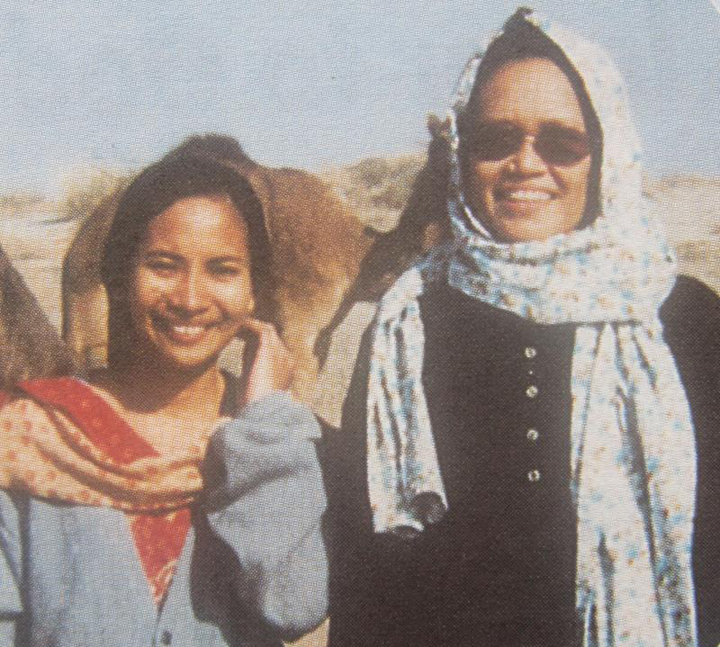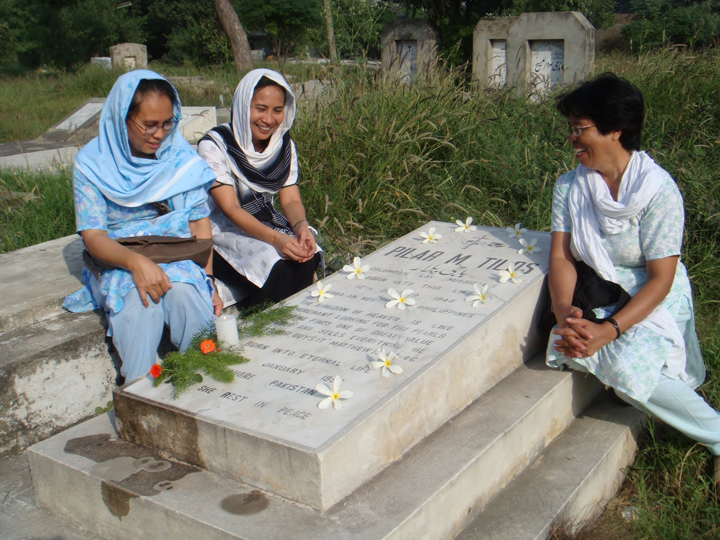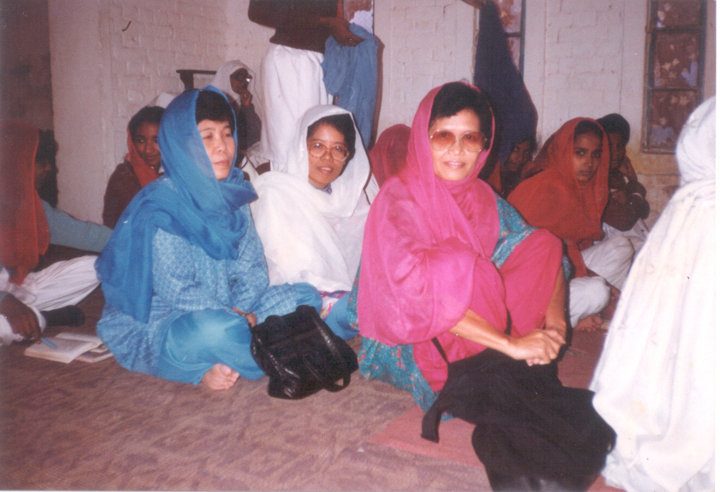The God of Surprises: Pilar and CLM Beginnings
By Fr Michael Martin
This is a slightly edited extract from the book Walking in Their Light, written by Columban Fr Michael Martin on the occasion of the Golden Jubilee of his ordination to the priesthood last year, 2015. September 2016 marks the end of a year of events for the Silver Jubilee of the Columban Lay Missionaries (CLM).
L to R: Emma Pabera, Gloria Canama and Pilar Tilos
Three Filipinas, Emma Pabera, from Candoni, Pilar Tilos from Hinoba-an, both in Negros Occidental and the Diocese of Kabankalan, and Gloria Canama from Tangub City, Misamis Occidental, Archdiocese of Ozamiz, resigned from their work in 1990 and came together for an eight-month team-building program to prepare themselves to go as Columban Lay Missionaries to Pakistan. The three were hard-working and experienced teachers, all from families really close to the Columbans, and all exceptionally enthused about that missionary way of being Church, Pilar Tilos, who had coordinated physical education, and assisted in promoting sports, dance, and music in the public elementary schools of Hinoba-an, the southernmost municipality in Negros Occidental, had long felt called to mission. She applied, was accepted, and joined the first Columban Philippine Lay Mission Team, named ‘RP1’. ‘Larps’ - her nickname - was a great mimic and the life and soul of many a party and parish activity.
The team spent three months in a Clinical Pastoral Education (CPE) course then available in a Presbyterian university hospital. As strong, determined, and sensitive women faced with the pain of the sick and the dying, they struggled in learning how to listen better and be gently with one another. They spent an even longer period in a lay leadership training program followed by an immersion in communities of empowered laity. Among the three, Pilar was the extrovert, the athlete, the dancer. They shared and prayed on the Word and the constants in mission, aware that the context, Pakistan, would be bewildering, but that the people would be welcoming.
In Pilar’s sending ceremony, she resembled a bride ready for the wedding, and not afraid of embracing the world. This time she was saying goodbye to her homeland, to her parish community, and to her group, ‘The Pearly Shells’, who had sung and danced and entertained together since they were children.
In the Hinoba-an parish community she was well known for standing up against the abuses of martial law (1971 – 1982 officially). Indeed, she assisted her co-teachers in another town when their supervisor stole part of their salaries. In fact, she successfully stopped this person from getting a retirement pension until all the victims were reimbursed.
It was my privilege to assist the three get ready for a new kind of work, a new kind of mission in which they would be pioneers. Columbans in the Philippines were searching for ways to assist partner churches to become more missionary, and the prospect of a team of three talented, educated Filipinas immersing themselves among women in a predominantly Muslim country was challenging. In order to reach out to the illiterate, Pilar and Emma and Gloria identified their need for special training in adult literacy, a course which served them well: they taught Christian women to read their scriptures, and they helped Muslim women find the face of God in their Qur’an.
Some Christian communities of impoverished people were alive and active in the Lahore area in north Pakistan, but they were small, and often isolated, even in the city. The clergy, including the Columbans, served them as well as they could, but the women members were even more marginalized. Female missionaries were a special blessing. They empowered the people especially through song and dance, livelihood-generating skills, awareness-raising, and committed accompaniment.
But God is a God of surprises, and the disciple is not above the Master, who himself prayed: ‘Not my will, but yours be done’.

Auring Luceño (Pagadian City) and Pilar Tilos in Pakistan
An entry in the Columban book of obituaries, Those Who Journeyed With Us, reads:
‘PILAR TILOS . . . baptized by a Columban, Pilar was a member of the 1990 Lay Mission Group, the first R.P. group to be assigned to Pakistan. Hard-working and full of life and humour, Pilar died in her sleep at St Columban’s, Lahore, on 4 January 1996 and is buried in Lahore.’
We treasure a striking, inspiring story of her farewell, written by Fr Pat McInerney, an Australian, the then Columban Co-ordinator in Pakistan:
‘We all gathered in the chapel around the body of Pilar for a Eucharist. All the Columban group in Lahore was present, and many friends and supporters from the Filipino community, the Sisters, parishioners, all united in shared shock and grief…
‘We prayed for Larps. We thanked her for her life. We thanked her for her faith. We thanked her for her laughter. We thanked her for her commitment to the poor. We thanked her for her simplicity. We thanked her for her fun. And in tears we told her we would miss her. The openness of that public sharing was deeply moving to all who were present, as we realized just how deeply and in how many different ways Pilar had touched the lives of us all. It was truly Eucharist, thanksgiving for the life and death of a friend.’
Pilar had served in Pakistan for five years before the Lord called her home. She had inspired people, and now her smile lives on in Hinoba-an, in Lahore, and in Columban missionary history and folklore. May she rest in peace.

CLMs Annie Budiongan (Loboc, Bohol), Auring Luceño and Gloria Canama at Pilar’s grave
[Editor’s note: The first 19 groups of CLMs from the Philippines are known as RP1, RP2, etc. Since the Government switched to using ‘PH’ instead of ‘RP’ as an international code for the country they have been known as PH20, PH21 etc.]
St Peter’s Catholic Church, Karachi

